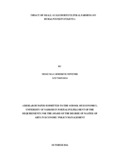| dc.description.abstract | Various studies on horticultural farming have acknowledged that the horticulture subsector
provides a great opportunity to escape from poverty through agricultural
commercialization. It is expected that horticultural farming will alleviate poverty
especially among rural small scale farmers through increased income and generation
of employment. This is because small scale farmers dominate the domestic market
and a small portion of the export market of horticultural produce. However, with
increasing demand for horticultural produce and such great potential in horticultural
farming to alleviate poverty, the majority of small scale farmers are still in poverty.
Using the 2005/6 Kenya Integrated Household Budget Survey (KIHBS) data, this
paper analyzes the impact of the horticultural sector on rural poverty in Kenya and
investigates the determinants of poverty amongst the small scale horticultural farmers.
To this end, the study adopts the logit model to estimate both the impact of
horticultural farming on rural poverty and the determinants of poverty among small
scale horticultural farmers.
The findings indicate that a farmer who engages in horticultural farming is less likely
to be poor than a non-horticultural farmer. This is because of the high production
value per unit land area, high labor intensity and short production cycles of
horticultural crop production as compared to other crops such as staple crops. The
study also found that a small scale horticultural farmer is less likely to be poor if he or
she is a member of a cooperative society, has a high level of education, has greater
access to credit, is of a young age, located in a fertile area among other variables
specified in the paper. Policy recommendations advocate for the integration of various
policies that focus on provision of different forms of capital, anti-discriminatory laws,
community development and policies to offset market failures. | en_US |



